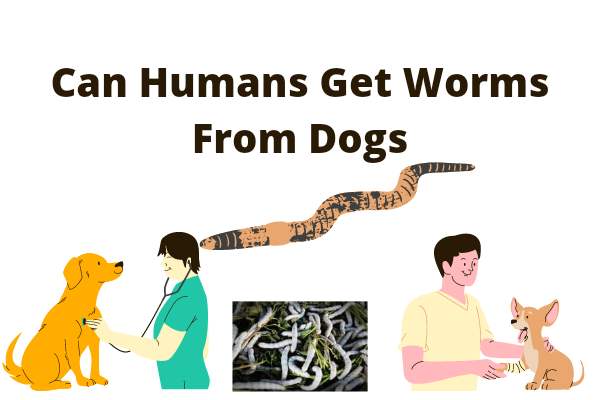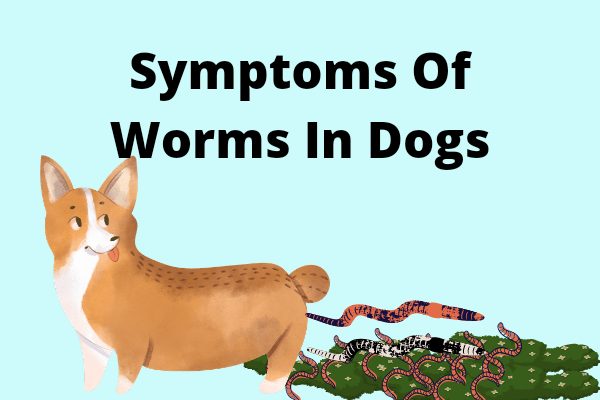Can Humans Get Worms From Dogs: 7 Ways You Can Get Worms

The question can humans get worms from dogs is a very interesting question and in this post, we will discuss all the possible ways you can get worms from your dog.
You may have heard that you can get worms from eating raw meat. But did you know that you could also get them by coming into contact with your furry friend?
Dogs can carry roundworms, tapeworms, and hookworms, which they can transfer to humans through their feces.
While it’s not common for someone to get these parasites, it can happen if they come into contact with an infected dog’s poop or vomit.
That’s why it’s important to take proper precautions when cleaning up after your pet.
If you think your dog might have worms, talk with your veterinarian about taking preventative measures.
It’s also a good idea to wash your hands after handling pets or anything in their environment.
Can Humans Get Worms From Dogs
Worms can be transmitted to humans if humans unintentionally consume worms or worms’ eggs or larvae through a worm-infected dog’s feces, vomit, and infected surfaces or food that humans then touch and eat.
Hookworms specifically are spread through the skin and can be picked up when walking barefoot or playing outside.
A small child may potentially consume the worm eggs by mistake, resulting in a roundworm.
Infection with hookworm can result in itchy, painful skin infections or stomach symptoms.
Roundworm infections can cause nerve or eye damage in some people, even if they show no symptoms.
Dogs can carry a worm called Toxocaracanis. It can cause a disease in humans called toxocariasis.
Therefore, if you have a dog, you should take steps to prevent your dog from spreading the infection to you or other people.
Do you know humans can also get worms from cats?
Types of worms humans can get from dogs
Here are the common types of worms that humans can get from dogs:
Roundworms
Wherever an infected dog has discharged feces, roundworm eggs can be discovered in the feces or the soil around the feces.
Roundworm larvae can move to internal organs and damage muscles, eyes, and the brain if roundworm eggs are accidentally consumed by humans.
Young children are thought to be the most vulnerable because they are more prone to play in polluted places, put items in their mouths, and have poor hand hygiene.
Tapeworms
Tapeworm is transmitted to dogs by the consumption of infected fleas.
The majority of human tapeworm infections are caused by eating tainted foods, however, children can get tapeworm by ingesting a flea-infested with tapeworm larvae.
Tapeworm segments can be seen in a pet’s feces or in the anal region in humans. These segments resemble rice grains in appearance.
If a human comes into touch with the feces of a dog infected with this parasite, they can get hydatid illness caused by tapeworms.
In humans, hydatid illness is a severe disorder caused by worm cysts forming in important organs such as the liver, lungs, and brain.
Hookworms
If you walk barefoot on polluted sand or soil, you might take up hookworm larvae.
In humans, the worms can cause cutaneous and/or intestinal illnesses by migrating through the skin.
Infection with hookworm can result in itchy, painful skin infections or stomach symptoms.
Hookworm infections can cause nerve or eye damage in some people, even if they show no symptoms.
Hookworm symptoms include diarrhea, lethargy, and anemia in young dogs and cats, although they are less prevalent in mature canines.
When humans get in contact with the worm eggs or larvae, the worm tends to continue its development in its new host.
Roundworms can cause disease in humans if we unknowingly eat the microscopic eggs that infected cats and dogs shed in their feces.
7 Common ways humans get worms from dogs
Here are some other common possible ways humans can get worms from dogs:
Walking barefoot on worm infected surfaces
Eggs can hatch into larvae, and both eggs and larvae can be discovered in the soil where animals have gone.
People can become sick when going barefoot or coming into touch with polluted dirt or sand.
The larvae in the contaminated soil or sand will burrow into the skin, causing irritation in that region.
Humans can get worms from contaminated soil
People can be afflicted with hookworms. The tiny, infective worm stages can burrow into our skin and cause discomfort and itching if we walk through a polluted region with bare feet.
When walking on moist sand or dirt, use shoes to decrease the chance of hookworm infection.
Dogs contaminate the soil by vomiting, and humans step on the vomit without knowing. Therefore, you need to improve the health of your dog.
Humans get worms from contact with infected dog food
If you mistakenly eat any food that your infected dog ate without your knowledge, there is a high chance you can get worms.
If you have a dog that has worms, and you don’t treat or give the dog proper medical attention, if the dog crosses paths with the food you eat, you can get worms.
Or your infected dog mistakenly licks your body, the dog can drop worm eggs on you which will affect you.
Humans can get worm eggs from kissing a worm infected dog
Zoonotic illnesses and parasites, or diseases and parasites that may pass from one species to another, such as from dog to human, can be transmitted through your dog’s affectionate licks.
If your dog has worm eggs, and you kiss your dog or allow your dog to lick your face, there is a high chance you can get worm eggs.
Direct kissing of your dog will not only give you worm but other bacterial pathogens as a dog mouth are loaded with microorganisms
Humans can get worms from dogs by petting an infected dog
Occasionally, dogs will have eggs on their fur due to licking. Petting your dog can transfer the eggs to your hands.
Dogs are known to lick themselves and can drop worm eggs on their fur or hair.
If you mistakenly come in contact with these worm eggs on their fur, there is a good chance you can contract worms.
Humans can get worms from contact with infected dog vomits
Taking anything to eat with the same hand you used to wipe an infected dog vomits after touching an infected dog, without washing your hands, is enough to swallow roundworm eggs.
Which will continue its growth and development on you and can cause unnecessary health challenges.
If your dog vomit often, you should consider visiting a veterinarian to fix it. Make sure you disinfect your dog’s vomit spot and wash your hands.
Humans can get worms from contact with a worm infected dog feces
The majority of worm infections in dogs are spread via the consumption of infected animals or excrement.
If your dog has worms, the worms will live in the intestines and lay eggs in the excrement.
Humans generally acquire worms by direct or indirect contact with feces, feces-contaminated soil, or feces-contaminated food.
Can dogs get worms from human
Dogs can get worms from humans as well as other animals.
The worms that dogs can get from humans include Roundworms, Hookworms, and Whipworms.
Roundworms: Roundworm eggs are typically passed in the stool of an infected person and eaten by a dog.
A single egg is capable of creating an entire infestation.
Hookworms: Hookworm eggs are found in dirt or soil contaminated with human feces and can be passed to a dog by way of the animal’s paws or fur.
Whipworms: Whipworms eggs become most infectious after they have been passed in the stool of an infected person and mixed with soil, where they will hatch and release larvae into the air for ingestion by a dog.
How did my dog get worms?
The tiny worm eggs are discharged in the feces of infected dogs. There are many ways dogs can also get heartworm.
By sniffing or licking contaminated excrement, other canines may get affected.
Other creatures, such as rats, earthworms, cockroaches, and birds, can spread worm eggs.
The worms are only carried in these animals and do not grow into adults; nevertheless, if a dog eats this paratenic host (an unintentional transport host), the worm can complete its life cycle.
To read details of how or where dogs get worms from, here is a detailed article on 9 common places where dogs get worms from.
Since fleas can transmit worms to dogs, here are some ways to keep fleas away from your dog.
How to diagnose your dog of worms
While tapeworms may be seen in the stool of a dog, other forms of intestinal worms are generally detected by examining eggs in a stool sample under a microscope.
Your veterinarian will ask you to provide a stool sample if your dog displays any of the symptoms.
Even if your dog shows no symptoms, it’s a good idea to bring a feces sample to your doctor for his yearly inspection.
A blood test is generally used to identify heartworms.
However, a radiograph, ultrasound, or echocardiography may be necessary for rare situations.
Deworming medicines, as well as preventive treatments, might be recommended by your veterinarian to treat various types of intestinal parasites and heartworms.
How are worms treated in humans
When discovered, oral medication can be provided.
However, surgery may be necessary if the infestation is severe enough to cause a blockage.
Similarly, surgery may be required to remove any hydatid cysts.
The anti-parasite medication will destroy any worms that are present in the body.
The dead worms either disintegrate completely or are transported out of the body through the feces.
If anemia has developed, increasing iron consumption will assist.
Other nutritional deficits can be addressed with a suitable dietary modification.
Symptoms of worm-infestation in dogs
Here are the common symptoms of worms in dogs;
- Loss of appetite
- Lethargy
- Diarrhea
- Weight loss
- Blood in stool
- Dehydration
- Abdominal pain
- Vomiting
- Rough coat appearance
How to prevent worm infestation in dogs
Here are some common ways to prevent worm infestation in dogs:
- Control fleas on your pet and in the environment.
- Seek treatment for your pet right away if you see signs of tapeworms.
- Keeping their environment clean
- Using deworming pills
- Proper and regular grooming
- Use flea control
- Rodent control
- Keep suspected pets away from your dog
- Don’t walk barefoot or garden in areas with bare hands.
- Teach children to always wash their hands after touching a dog or cat or playing outside.
- Stop your dog from eating early morning green grass outside your doorstep.
- Keep your dog drinking water away from windows and doors.
- Don’t let your dog drink from a watering can that has water for more than 2 days.
- Keep raw eggs away from your dog.
- Have your kittens and puppies dewormed by the vet.
- Make sure you don’t feed contaminated raw meat to your dog.
How can hookworms from dogs harm humans?
Hookworm larvae typically move around within the skin causing inflammation and red, itchy tracks in the affected skin.
This is called cutaneous (skin) larva migrans. One type of hookworm can make its way into deeper tissues and cause more serious damage to the intestines and other organs.
How can roundworms from dogs harm humans
Ingesting roundworm eggs, which develop into larvae, allows them to enter the body. The liver, lungs, and other organs are all visited by these larvae.
They can, however, cause tissue damage in certain situations. They can sometimes damage the nerves or even reach the eyes.
Furthermore, they may cause lifelong nerve or eye damage, or even blindness, in certain circumstances.
Dogs transmit worm eggs to humans through their feces and vomit.






